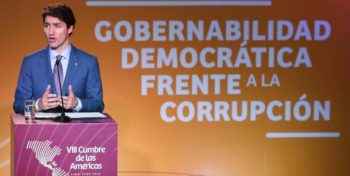
McLeod Group blog by Laura Macdonald and Megan Pickup, April 19, 2018
Justin Trudeau rushed home early from the Summit of the Americas in Lima, Peru on Saturday to attend what was for him a more politically relevant summit – the one between Alberta premier Rachel Notley and B.C. premier John Horgan on the Kinder Morgan pipeline. Simultaneously, the summit in Lima was also overshadowed internationally, in this case by the decision of U.S. President Donald Trump to bomb Syria in response to that government’s chemical attacks on civilians in the town of Douma.
The Summit of the Americas is a meeting of leaders from the 34 members of the Organization of American States (OAS), which has taken place every three years since 1994. The summit is a unique political opportunity as it is a hemispheric forum of country leaders in which the United States and Canada participate.
Trudeau’s team was undoubtedly happy that he was able to escape the summit without any gaffes or colourful costume changes – in contrast with his ineptly planned and executed trip to India in February. And the attention of the Canadian media was distracted by the conflict between western premiers, the strikes on Syria (for which Trudeau was able to express Canadian support to U.S. Vice President Mike Pence in Lima), and the scandals and goings-on in Washington. However, the fact that Canada’s participation in the summit received little attention and was cut short is unfortunate, given that the region of Latin America and the Caribbean faces important challenges, and the summit provides a unique chance for Canada to up its game in the region.
This was the first summit that was not attended by the U.S. President, a sign not just of Trump’s own lack of interest, but the declining relevance of the United States in the region. The waning of U.S. hegemony may open up space for Canada to play a more prominent and progressive role, but taking up this role is dependent on a more expansive, coherent approach to the region and its troubles.
The theme of this year’s summit was “Democratic Governance against Corruption”. It was certainly timely, but many observers commented on the irony that many Summit participants themselves were facing charges of corruption. The phrase “leaving the fox in charge of the henhouse” seems apt.
Even the summit’s host, Peruvian President Martin Vizcarra, has only been in office a few weeks, since the former president, Pedro Pablo Kuczynski, was forced to resign over a corruption scandal on March 23. Kuczynski, like many other presidents and politicians in the region, has been charged with receiving bribes and campaign financing from the Brazilian construction company Odebrecht.
Recently, Lula da Silva, the former Brazilian president and still the country’s most popular politician (a recent poll estimates he beats his rival 2:1 in one possible election scenario), has been sent to jail on corruption charges, likely thwarting his new presidential aspirations. At the same time, Brazilian President Michel Temer and many other Brazilian politicians who have also been linked to corruption remain free and in charge of the political system, prompting observers to question the selectivity of the justice system. These cases are not unique, and problems of corruption are endemic throughout the region.
The government of Canada went to the summit armed with good ideas about sharing “best practices” and reinforcing tools such as the Mechanism for Follow-Up on the Implementation of the Inter-American Convention against Corruption, an inter-governmental body within the OAS. Canada has also provided financial support to the OAS Mission to Support the Fight against Corruption and Impunity in Honduras and to the International Commission against Impunity in Guatemala.
Trudeau took the opportunity to meet with his counterparts from Mexico, Chile, Colombia, Peru and Argentina on the sidelines of the event. He also addressed a meeting of business leaders from the region to underline Canada’s commitment to free trade and to modernizing and expanding existing trade agreements.
Canada also participated in efforts of the region’s leaders to isolate Venezuela (whose leader Nicolás Maduro was not invited to attend the meeting) and to develop some joint mechanisms to punish that country’s government for its plan to hold a presidential election that the country’s opposition is boycotting and that many consider a sham. However, many observers fear that the split between more conservative and left-leaning governments on the Venezuelan issue will prevent progress.
Canada’s efforts are positive, but limited. And the current government must do more to address the ways in which its own commitment to promoting Canada’s investment and trade interests may draw it into supporting corrupt forces in the countries where it does business.
On Monday, for example, the NGO Above Ground released a report that alleged that Export Development Canada, a government agency that plays an important role in promoting Canadian business deals abroad, suffers from weaknesses in its regulations and screening procedures that open it up to involvement with corrupt companies. And the government has experienced heavy criticism about the role of Canadian mining interests in Latin America (and elsewhere in the world), leading to Trade Minister François-Philippe Champagne’s announcement in January of an independent Canadian Ombudsperson for Responsible Enterprise. The person has not yet been appointed, however, and it is yet to be seen whether a new ombudsperson will be successful in curtailing Canadian companies’ abuses abroad and their links to corruption.
Unfortunately, a combination of domestic and international crises prevented Canada’s full engagement in the recent Summit of the Americas. While the Prime Minister’s decision to cut the trip short is understandable from a short-term perspective, the Americas are also in the midst of a pervasive and seemingly endless crisis. Canada has real opportunities to take on a more progressive role in the hemisphere. This missed opportunity should prompt the government to not let others slip by.
Photo credit: Juan Pablo Azabache/Associated Press.
